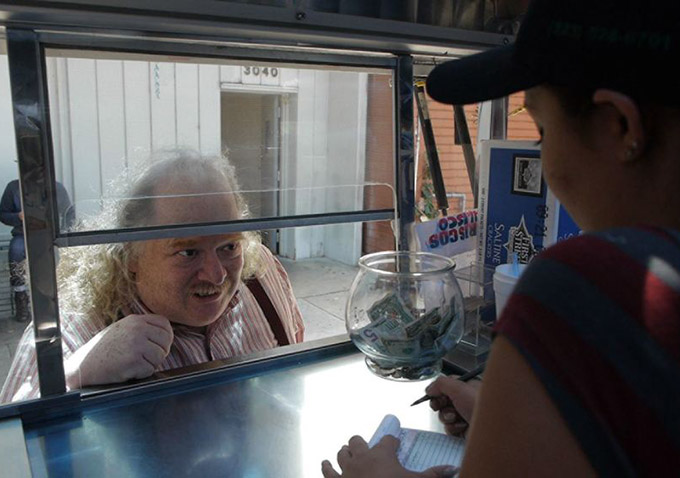This documentary about Los Angeles Times restaurant critic Jonathan Gold sets the bar high by opening with a quote from one of America’s greatest food writers, MFK Fisher. However, “City of Gold” offers a convincing, wholly entertaining argument that Gold deserves to be included in the same sentence as that culinary writing giant. Not only is he a master of prose, but he is also someone who has changed the LA food (and foodie) scene, as well as the lives of the restaurateurs he writes about.
What sets Gold apart from his contemporaries — other than truly gifted writing — is his ability to go beyond the city’s most expensive restaurants and find the best undiscovered gems in oft-overlooked neighborhoods. Though this is a less revolutionary approach in 2016, “City of Gold” casts the critic as a pioneer, bringing the attention of the masses to tiny spots in Little Ethiopia, Tehrangeles and Alhambra. His reviews in LA Weekly and the LA Times not only introduce people to new restaurants and entire styles of cuisines, but multiple restaurant owners share success stories of how his coverage changed their business’s fates, turning them into the ideal version of the American dream. It shouldn’t be lost on the audience that these chefs are often immigrants or those serving the food taught to them by their immigrant families. According to the film, Gold appears to be doing not just good work, but patently good work.
READ MORE: The 20 Best Documentaries Of 2015
“City of Gold” takes an affectionate, earnest approach to its subject. It is as much a gushing endorsement of the writer as it is his home city. Los Angeles has rarely looked so attractive to this New Yorker. There’s little focus on neighborhoods that normally hog the spotlight in film and television, instead creating a picture of a sprawling, diverse city full of the best meals you could imagine, with many of them found in strip malls.
The worst criticism lobbed at Gold, and one he owns up to, is that despite writing 150,000 words a year, the man cannot work on deadline and often requires an editor’s harassment to turn in a late piece. Throughout “City of Gold,” he is painted as nearly deserving of sainthood, but the film may have benefitted from presenting opposition to Gold and/or his approach. That said, this documentary isn’t meant as a statement about a political figure and isn’t as in need of offering a full picture of its subject for society’s sake.
The score from Bobby Johnston is as varied as Gold’s palate, ranging from jazz to a variety of international pieces that reflect the food being covered. Regardless of the genre represented, each song is lively and diverse. Gold’s own background as a cellist and pop music writer who covered Dr. Dre and the West Coast rap scene also adds aural variety to the background.
Though I doubt director Laura Gabbert’s intentions were solely to curry favor with film critics, “City of Gold” does so. In an age where Yelp (as well as Amazon, Facebook, and the rest of the internet) means that anyone can be a critic, the value of professional criticism is in question. This documentary advocates for its importance. Anyone can offer their opinion on a restaurant or a film, but the pros bring additional knowledge and research to the table in a way that many people don’t. Before trying a Sichuan restaurant in the San Gabriel Valley, Gold pores over books about Chengdu cuisine, as well as using translation software to read reviews on the internet. Like many food critics, he visits restaurants multiple times before making his judgment. “City of Gold” argues that there is a special value in what critics do, holding its subject up as an example.
This film is a significant step up for Gabbert, who last directed “No Impact Man,” which was probably a bit more true to its title than it would’ve liked. “City of Gold” is well-constructed, offering insight into Gold’s process and his life, as well as talking head interviews or appearances with a variety of big names in food, including Calvin Trillin, David Chang, Andrew Zimmern and Nancy Silverton.
“City of Gold” is more than just an incredibly entertaining foodie doc or a biographical film. It offers — and backs up — the idea that Gold’s influence extends beyond the culinary world. It meanders from its prescribed path, delving into immigrant law, music and culture, and this gives it an appeal beyond the traditional food-focused film and elevates it appropriately. Despite its scope, it always comes back to Los Angeles food and its biggest fan. Gold’s enthusiasm is infectious, and the film never lacks energy, passion or humor. Unlike your favorite hole-in-the-wall restaurant that you almost hope stays a secret, this is a film worth sharing. [A-]

